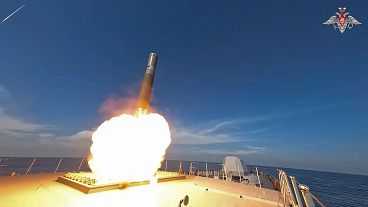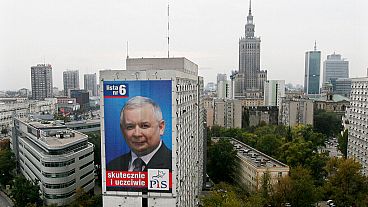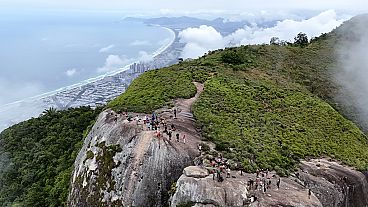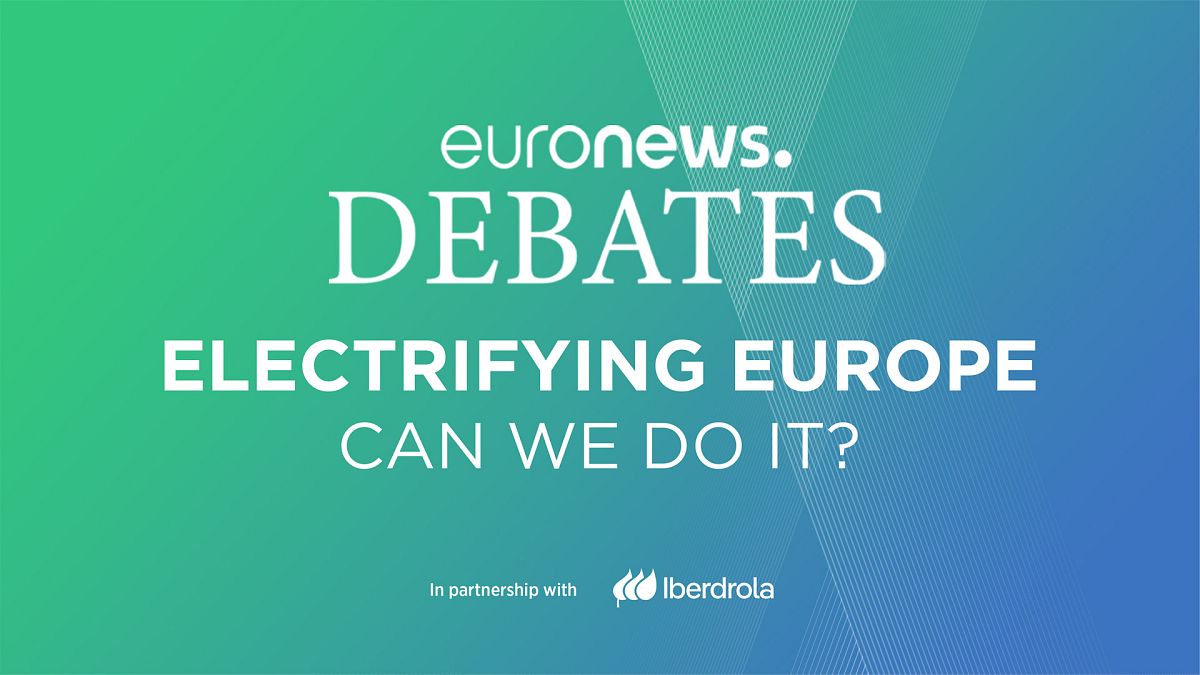Can the EU electrify its energy systems, keep its climate promises and maintain stable energy prices after the European elections? What's needed to attract investors? What does it mean for consumers? We asked our panel of experts from politics, policy and industry.
The electrification of Europe is key to the bloc meeting its climate goals and ambition to contain energy prices, but a political shake-up at the upcoming European elections in June, and barriers accessing financing could hinder Europe’s clean power roadmap.
In the EU’s 2019 elections, green parties made significant gains across the bloc. The vote pushed the then-new Commission President Ursula von der Leyen to present the ambitious Green Deal, which aims to make Europe climate-neutral by 2050.
But the EU Parliament is set to change in the June vote, with polls showing a shift to right-leaning populist political parties in many countries.
According to the European Council on Foreign Relations (ECFR), centre-left and green parties are predicted to lose their votes and seats, while radical right parties will make gains.
Is Europe’s Green Deal under threat with a new parliament? Can Europe electrify? And what barriers must it overcome? We put these questions to our panel of experts and politicians in our debate in the European Parliament.
You can watch the entire debate in the video player below:
"Whatever the [new] parliament is they will not reverse legislation, because the industries are aware of what is happening geopolitically and I think they support a deal at the end of the day,” said Mohammed Chahim, Dutch Member of the European Parliament in the Progressive Alliance of Socialists and Democrats.
Electrifying Europe is not just about creating a greener planet, it is also about protecting energy consumers from unstable prices.
Russia’s invasion of Ukraine and the subsequent energy crisis saw prices jump due to low supply.
As a result, last December, the European Council and Parliament reached a provisional political agreement on the Electricity Market Reform.
Its goal is not just to increase green electricity but also to protect consumers from rising electricity prices. The rules have yet to be formally approved and may be subject to change under a new EU leadership.
“Shifting our energy models to respond to the political crises we are dealing with transcends party politics, it’s about jobs, it’s about energy security, autonomy, climate action,” said Pierre Tardieu, chief policy officer at WindEurope.
But he said the European elections were important and his association is urging people in the wind industry to vote.
What stands in the way of renewable energy?
The European Commission realises the urgency to meet the bloc’s 2050 climate ambitions. It set out a roadmap in February 2024 to reach a 90% net greenhouse gas emissions reduction by 2040 compared to 1990 levels, which is in line with recent scientific advice and the EU’s commitments under the Paris Agreement.
According to Chahim, if Europe continues the pace now agreed upon between 2020 and 2030 and we continue that pace between 2030 and 2040, it will automatically reach a 90 per cent emissions reduction by 2040.
“We have started a movement with the industry that some of the goals will be met whether there is a progressive or conservative majority in this house, because it’s called technology, innovation and development,” he said
“Once a certain technology is under a certain cost, people will invest in it, not because of climate or energy transition, it is just a way to make money.”
The investment framework, grid integration and supply chain capacity are all obstacles to using more renewable energy in Europe today.
“I think it has been obvious that investment has been on standby at the moment we need the acceleration of renewables,” said Eva Chamizo Llatas, director of European affairs at Iberdrola.
“I think that what we need after the lessons learned is regulation, stability in the regulation, and stability in the long term view.”
Tardieu said he saw a wind investment “nosedive” at the height of the energy crisis due to “uncertainty about what governments were going to do about soaring electricity prices”.
He said things are picking up, yet wind is being deployed at half the rate we need to meet even the 2030 targets.
“Going back to cheap fossil fuels isn’t on the cards anymore. So we do whatever to deliver electricity as cheaply as cost-effective as possible,” agreed Tom Howes, advisor to the director in the energy department of the European Commission responsible for the green transition and energy system integration.
But he said to ensure that happens, “the long-term vision is absolutely necessary [for investors]”.
Smart grids and the long view
One of the key technologies to the electrification of Europe is smart grids, both in transmission and distribution.
“During the Great Depression, there was the investment in the Hoover Dam,” said Tardieu. “This is what we need for Europe, for electricity grids, and it is a massive investment plan.”
Chamizo Llatas said for electrification to happen, it needs grids and this will be the “next bottleneck” if they are not developed.
“The next Commission has understood it perfectly well and the girds are the next step… you have to bring your electricity out and meet demand,” she said.
Smart grids should allow Europe to best use energy storage technologies such as pumped hydro power and green hydrogen.
Unfair competition?
Another challenge is that the cost of materials has increased and there is intense competition from Chinese turbine and solar manufacturers who sell at much cheaper prices than their European counterparts.
In 2022, the International Energy Agency (IEA) found that the world relied on China for more than 80 per cent of the supplies needed for solar panels.
“We live in an open market in a globalised world, we like competition as long as it’s fair,” said Tardieu.
“The European Commission has been very clear that they will take a close look at whether there have been disruptions on the internal market when it comes to wind energy,” he added.
For Chamizo from Iberdrola, the next parliament must look to the future so that the next generation of solar panels are made in Europe.
“The reason the Commission was created was because we need a single market. What we are seeing lately is a fragmentation that comes from taxes,” she said.
“We don’t have to go back to fragmentation, which the crisis has created."
“If I look at the energy mix, we need to look at it from a European perspective as if we are one country… They are connected, they can help each other,” said MEP Chahim.
“But at the same time, we need to look at investment and industry at a European level. We need an industry policy from a European perspective,” he said.
Meet our panel
Dr Mohammed Chahim is a Member of the European Parliament for the Dutch social democrats. He is a member of the committee on environment, health and food safety and the committee on industry research and energy. He is vice-president of the S&D group, responsible for climate & energy policies and the European Green Deal.
Previously, he worked as a researcher in environmental economics and energy transition at the Dutch organisation for applied scientific research (TNO).
Pierre Tardieu is chief policy officer at WindEurope. He leads WindEurope’s policy department covering advocacy, innovation, market intelligence and stakeholder engagement. Pierre also co-manages the Renewable Hydrogen Coalition, the Energy Storage Coalition and RE-Source. He joined WindEurope in 2011 and has a decade and a half of experience in European climate and energy policy.
Tom Howes is the advisor to the director in the energy department of the European Commission responsible for the green transition and energy system integration, including electricity market design. Until June 2022, he was head of the Energy and Environment Division at the International Energy Agency (IEA), leading work on energy sector resilience, and supporting the IEA at COP.
In the past, he has worked on renewable energy market and grid integration issues, energy modelling, and energy finance, for the European Commission and the UK and Australian governments.
Eva Chamizo Llatas is the director of European affairs at Iberdrola and secretary non-director of Iberdrola Energía Internacional's board. She is also a member of the board of directors at the Spanish Chamber of Commerce in Belgium and Luxemburg.
Her roles before this included being president of the European Association for Storage of Energy and working as a state attorney in the legal service of the Permanent Representation of Spain to the European Union. In this period, she was a member of various working groups in the Council of the European Union, during two Spanish Presidencies of the Union (2002 and 2010).

















